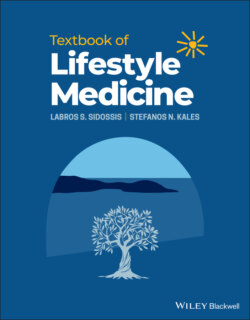Читать книгу Textbook of Lifestyle Medicine - Labros S. Sidossis - Страница 106
Key Point
ОглавлениеVegans must regularly consume sources of vitamin B12 and D, omega-3 fatty acids, Ca, iodine, iron, and zinc.
Many people consider vegetarian diets to be superior to nonvegetarian diets, in terms of quality. This is because the vegetarian food choices are high in dietary fibers, magnesium (Mg), potassium (K), vitamins C and E, folate, carotenoids, and other phytochemical substances, and they are low in saturated fat, cholesterol, and sodium content. Vegetarian dietary patterns have been shown to reduce cardiometabolic risk, including the risk of developing T2DM and hypertension. Results from large clinical trials suggest that vegetarian dietary patterns can improve ΗbA1c, fasting glucose levels, and other established cardiometabolic risk factors, such as high LDL‐C and high systolic and diastolic BP compared to nonvegetarian dietary patterns.
Results from large cohort studies, with a follow‐up period ranging from 4 to 21 years, show that the vegetarian dietary pattern is associated with reduced overall incidence of cancer, compared to nonvegetarians. The mechanism(s) mediating the effect of vegetarian diets on cancer risk is not known. It has been suggested that vegetarians have lower levels of hs‐CRP compared to people who eat meat; the high antioxidant and anti‐inflammatory effects of the food groups included in this pattern may also result in lower inflammation in the long term.
Adopting a vegetarian diet results in significantly lower CVD risk. The protective effect of vegetarian diets on cardiovascular risk seems to be mediated by the reduction of meat consumption and the increased consumption of fruits and vegetables. For each additional serving of fruits and vegetables consumed, the likelihood of all‐cause mortality decreases by 5%, while eating more than five servings/day does not appear to further mitigate the risk. Regarding CVD deaths, for each daily serving of fruits and vegetables per day, CVD mortality is reduced by 4%.
